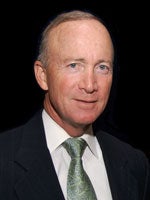At a Nov. 29 talk co-sponsored by the Harvard Federalist Society, Indiana Gov. Mitch Daniels shared his experience in leading the charge for a new law that enacted a series of secondary education reforms in Indiana last year—reforms which many observers have called the most far-reaching changes yet adopted by any state.
Under the new law, teachers are evaluated in reference to how well their students do, and will not be penalized for a lack of seniority, said Daniels, who is a Republican. But most importantly, he said, Indiana has expanded the ability of families to determine where their children go to school. A 2008 law had allowed children to attend any public school, including those outside their districts, without being charged tuition. The 2011 law further extended that, instituting a voucher program giving all families below an income cap a voucher for tuition at any eligible private school.
In the program’s first year, nearly 10,000 students used vouchers, or 1 percent of the K-12 students in Indiana. Of those, 81 percent are from the lowest income category, 50 percent are minorities and two-thirds are from urban areas.
To Daniels, these reforms are in large part about promoting choice, with consequences that are twofold. For one, the 2008 law almost immediately led to quality improvement. He began to see school-sponsored billboards across Indiana, advertising high test scores and exhorting families to send their children to particular schools.
“Competition is real and springs into being rather quickly when you create the conditions for it,” Daniels said.“One percent of our students isn’t very many, but it’s having a highly leveraged effect on other schools who would like to successfully match what’s being done so kids don’t leave.”
But more importantly, said Daniels, choice in education is also an issue of social justice. In his view, wealthy families should not have more options for their children to attend school than poor families. Inadequate education is blighting the lives of many children in the United States, he said, and people may have become desensitized.
In Indiana, Daniels said, his proposed reforms were hindered by the teachers union as well as individuals “deeply invested in the bureaucracy of public education. But in 2010, the Republicans were elected to a majority in both houses of the state Congress. Though he had to make compromises—he had hoped for a higher income cap, for example – the law was passed.
And in general, he argued, there is a sea change happening; support for legislation like Indiana’s is growing across the political spectrum. For example, Daniels said, Indiana’s superintendent of public education is an elected official, and last month a union leader was elected to that position. Although many Democrats may not support universal vouchers, Daniels said, they agree on the rest of his agenda.
“There are so many good-hearted people with whom I differ on other issues to have come together around the kind of changes that we have enacted in Indiana that I have really high hopes that this time the forces of reaction will not roll things back,” he said.
Following Daniels’ lecture, HLS Dean Martha Minow—who has worked on education issues over the course of her career—conducted a question-and-answer session with him to discuss some of the voucher program’s policy implications.
Minow noted that the legislation requires that students attend public school for at least one year in order to receive a voucher. As a result, she said, a number of children who were previously attending private school have shifted to public school to become eligible. According to Daniels, this is just a transition issue.
“We said to the public schools, you get first shot!” Daniels said. “If you do a good job they’re not going to want to leave. But if they come to your school for a year and the family decides that it’s not best for the child, then we shouldn’t incarcerate them there.”
Asked about the charge that vouchers might hollow out the diversity of the “common school,” which is supposed to integrate children from different backgrounds, Daniels said that these criticisms are unfounded. Charter schools and voucher schools serve low-income children and are more integrated than the public schools nearby, he said.
Minow then posed a hypothetical to Daniels: Parents have a right to choose to send their children to private school, and each state’s constitution protects the public school system. But what if there were no public schools—only private schools? Daniels said that providing quality education should be among the top priorities of government.
“As free market as my instincts [are], I wouldn’t leave it to chance that the market called into existence the right kind of schools without that structure in place,” Daniels said.
When his current term as governor expires in January 2013, Daniels will take up a new post as the president of Purdue University.
